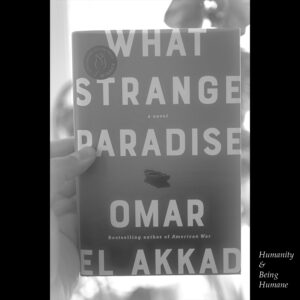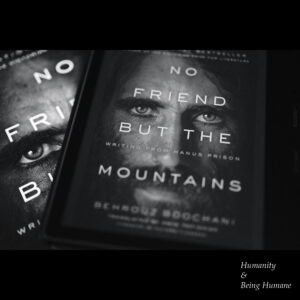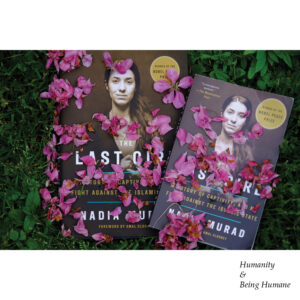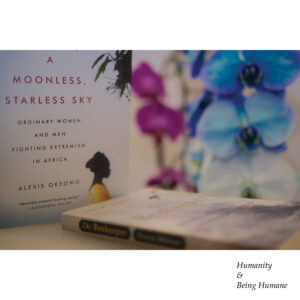Note: Details regarding the identities, racial and national backgrounds, specific locations and genders have been changed to protect the identities of those vulnerable and for a potential criminal case.
Introduction
Today is World Refugee Day. The topic of refugees is a complex matter and one that triggers a strange visceral reaction in people. In many people, it forces their forefront lobes to quickly give up the controls and recede control over their reptilian brains. But does it need to be so complicated? Today, we’ll look at a couple of different avenues of this topic and why ultimately, it speaks so resoundingly poorly about us as a species.

I had arrived at the Tim Horton’s, which was the most convent for him, for he still had not been able to procure a vehicle. As I settled in after ordering his favourite selection of Timbits, I saw him make his awkward entrance through the narrow, claustrophobic quadruple door foyer. While humorously jostling for the right to enter with another, it was obvious that the scars left on our social skills from the pandemic were indeed still open, if not rotting, exposed to the elements.
“Am I late,” he asked as he sat down in the disturbing way Commander Riker did in Star Trek – by lifting one leg over the backrest and setting himself down.
“I really did not need to see that. You do know that way of sitting is not funny when you are wearing shorts, right?”
He looked at me, stunned. As he stumbled for the right words to apologize for exposing me and those sitting behind me to his very own Timbits, I assured him that all was well and that no acts of indecency were accomplished.
“So, how’s your dad,” I asked a few minutes later after we made our way through the bite-sized deserts and a reorder of our coffees.
“He’s,” the pause genuine, for he was surprised about the change in tone the subject deserved. “He’s all right. At first, he hated all recent refugees, but once the trauma started wavering and the fact that his new caregiver was an absolute angel, he started to come around again.” His father was the victim of assault from a caregiver months before while he was waking up and asking for assistance to get out of his hospital bed. Apparently, the caregiver snapped and went into a violent place. “It’s like he regressed into a weird mental state of being fuelled by hate out of fear.”
Variations on the Theme of Tribalism
At the start of the pandemic, as loneliness became overbearing and forced many to only resort to whichever off-brand nationalistically charged websites for information, I saw my direct message inbox get filled with vitriol for those not only from Asia (whom they blamed for the pandemic) but that of everyone who was not Caucasian.
“No matter what, I will protect my country,” wrote one watch collector.
I replied, “what the hell does that have to do with your Seiko having an in-house movement?” He didn’t have a reply, for the outward hatred towards humans labelled as “others” was overwhelming. During the pandemic, the amount of hate-driven violence towards ethnic minorities exploded and continues to rise with mass shootings and targeted individual attacks.

Most people who have not been forced to leave their homelands due to impending horrors fail to understand that no one wants to uproot their lives and leave their homes. To leave the land where you share a history, culture, cuisine, and traditions for a distant land where everyone not only looks and behaves differently than you but also looks upon your existence with suspicion and spite is not something people look forward to. Whether it be fleeing a region due to famine and the violence and human trafficking that comes about after that, desperately leaving your country which is being shelled by indiscriminate missiles, to sneaking out in the middle of the night to keep your family safe from murder and unspeakable sexual violence, people become refugees out of necessity. The necessity, in this case, is to survive.
My family left the country of origin due to the quick rise of a totalitarian regime. They saw family members, friends, and co-workers jailed and murdered due to having some affiliation with a wrong political group or by simply being different in a manner deemed unacceptable. Upon arriving in Canada, I enjoyed a distinct privilege rarely experienced by a refugee. This privilege was one of ambiguity, which I enjoyed up until the attacks on the World Trade Centre. I was not African, Asian, or Arab, but a slightly furrier than average Caucasian. Thus, the “tribe” I belonged to was not recognizable and required effort to categorize. What resulted in most cases was not being seen as a threat until that effort was decreased.
As a result, I did not experience the racism that many of my friends did. I was also never accepted into being wholly Canadian either, putting me into a no-man’s land where I acted as an observer until 2001. That changed in the autumn of 2001, and anyone who resembled a Middle Eastern was now fair game for the racists. And yes, this included Canadians. Shortly after the attacks and for a couple of years afterwards, I would watch parents grasp their children’s arms and bring them closer to themselves as they walked past me in malls. When sitting in a cafe, grown men went on a hilariously factually incorrect tirade against Jewish people, for in their eyes on that day, I looked like an Israeli. In all encounters with racists, I never obliged them with a rebuttal or even recognized their existence as I quietly moved on with my day. This included a couple of attempts at violence in decades past, where I am still fortunate to be a much faster runner than most people can mentally make sense of when seen in action.
Every time, I wanted to mention how refugees were fulfilling the jobs that they simply would not. Knowing this would fall upon deaf ears, I always made my silent escape. This fact though true in the last two decades has become resoundingly truthful in the previous year and a half. This was due to taking loved ones in and out of many medical facilities and hiring caregivers. In every instance, the nurse, caregiver, and cleaner were not Caucasian Canadian and were immigrants. Some had gained Canadian citizenship, but all received the same treatment from the incumbent Canadian patients. Looks of suspicion and outright racial slurs were thrown in their direction without discretion, and false claims that they were stealing items while they slept ran rampant. Patients who were immigrants to this land behaved differently. They looked on with kindness and understanding. I was again transported to the overseer role in these environments, for I was an outsider. Neither professional caregiver, nurse or patient, I stood at the margins and watched how people treated each other in their native environment. When speaking with those working these jobs that Caucasian Canadians avoided, everyone mentioned how they came to Canada not only out of a sense of increased opportunity but that for survival.
Unexpected Sources of Variations in Kindness and their Justifications
It was called ‘the girl’s roundtable,’ and it was something they all looked towards every morning. Its participants included an elderly lady employed by the caregiver and a personal support worker who stopped by every morning to handle the more complex tasks. It was mid-March and a couple of weeks into the Russian invasion of Ukraine, which would see an outpouring of refugees from Ukraine in the millions.
“It is maddening how racist people are,” said the caregiver as the news played on the television in the background. “Look at these poor people. Look at all those children,” she said as she stood up, walked over to the television, and pointed out one child in particular. This child was huddled in the corner of the subway station with the one item he chose to take with him as his family fled. Heartbreakingly, this item was their stuffed cat which had passed away recently. However, when the topic shifted from the suffering within Ukraine to Canada’s response, the tone in which the personal support worker and caregiver shifted dramatically. Looking upon the enthusiasm with which the refugees from Ukraine were being embraced, they both looked at each other and agreed.
“I was never greeted with such open arms,” said the caregiver, who comes from a land that still witnesses horrible ethnic violence. The PSW nodded in agreement. If only I were white with blue eyes, then maybe I would have come here and chosen a job that didn’t include cleaning shit all day.”
“Don’t look at me; I was in the restaurant industry for years after first arriving,” she said as we laughed. “I like you chose this.”
It was then that I realized how easily we as humans allowed our frontal lobes to give up the helm controls and to let our Reptilian brains take over and steer us towards the path of apathy. Whether it was Syrian, Yazidi, Iraqi, Ethiopian or the Rohingya, none were recently received with the overwhelming welcome as did the recent refugees from Ukraine who are being murdered indiscriminately back in their homeland. Whether it was the Europeans calling the visible minority refugees that stumbled onto their borders through abhorrent human trafficking schemes, which added a level of suffering that their critics could never even conceive, or those who were systematically chosen and brought over, disturbing patterns emerged. Here in Canada, a narrative was spun that the selected Ukrainian refugees were skilled in computer sciences and would fill in much-needed gaps in our employment sector. This was not true. This was done to ease one’s conscience and accept this new wave of refugees so willingly. Especially when recent memory easily recalls doing the opposite to others who looked different than the incumbent Canadians and Europeans. The contrast between the recent flotilla of supporters versus the street-lined protests against immigration is too apparent in our minds to set aside.

Commoditized Immigrants and Migrant Workers and What They Reveal About Us
“Keep in mind that I worked in Saudi Arabia as a migrant worker for years before coming here. We were treated like appliances and paid only when our employers felt like it,” the personal support worker added.
Many regions have an inhumane relationship with those who come from lands where they are less fortunate than themselves. Many Middle Eastern and Asian countries import cheap labour for the jobs that are considered undesirable. They are then discarded at the slightest whim of their employer and, as we had seen with the first stages of the COVID-19 pandemic, treated as subhumans during a crisis.
Whether looking to blame incoming refugees for the loss of opportunity in one’s land, commoditizing them and extracting everything you can from them like an appliance or viewing them as criminals, we have to do better. These reactions are so innate to our species that it leaves one to wonder whether humanity is all it is cracked up to be. It is easy for many of you who are reading this to say to yourselves that you are already doing the best you can. The next time you are in a position of stress or duress like the older man at the beginning of this article, observe how you behave and think. No matter how sweet and kind a person is, it is astonishing how incredibly quickly they can turn towards people they deem to be “others.”
A Desperate Conclusion Resulting from Exhaustion
Should it not be enough to see that others are fleeing horrific violence and persecution to accept them amongst your fold? Do they have to look like you? Do they have to practice a similar religion? Is the criterion above necessary for them to be human and thus deserve your humanity? Well, perhaps not.
These people deserve for you to behave humanely. Humanity, in its very base nature, resorts to unkindness and protectionism if not overtly comfortable. This includes some of the hatred I have seen shown towards Ukrainians in the past month and a half. Some recent migrants of colour always point out that the suffering of the Ukrainians is less than they had endured. I am disheartened when I hear this, for I would have thought that it would have been easier for them to understand the plight and suffering of others more quickly than those who had not experienced migrant under extreme pressure. This is incredibly distressing due to the never before seen levels of photographs and reporting of the carnage in a war zone that is being put out as it is in Ukraine.
Regardless of where people are fleeing from and what they look like, it is heartbreaking to see this happen repeatedly. I will include a list of books at the end of this article to read in case you have ever felt apathy or indifference towards refugees. After reading these titles, you will see that no matter where we come from, we are all literally the same. All we wish for is the safety and security of our loved ones, the right to buy a piece of land through hard work and build a life.
Our blind faith and faith itself has repeatedly caused so much harm in the creation of eternal refugee camps, and racism thrust upon those who do manage to integrate into their new nation’s workforce. It is time for the emphasis on acting humanely, as though we would like to behave and be treated, rather than have blind faith in humanity.

Recommended reading:
“The Last Girl” by Nadia Murad (book review can be found on this site)
“A Moonless Starless Sky” by Alexis Okeowo (book review can be found on this site)
“The Beekeeper” by Dunya Mikhail (book review can be found on this site)
“What Strange Paradise” by Omar El Akhad
“No Friend but the Mountains” by Behrouz Boochani